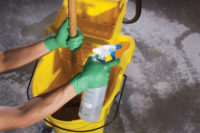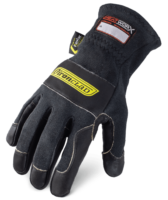3D glove developed in the U.K.

Developed at JLR’s Gaydon site – home to one of the largest 3D printing facilities in the UK – the glove is based on a lightweight lattice structure optimized to provide support to reduce muscle fatigue but also to be flexible and comfortable enough to wear during an eight-hour shift.
The company claims that it could help better protect employees on the production line from the threat of a musculoskeletal disorder. According to the U.S. Bureau of Labor Statistics, musculoskeletal disorders, which include more than 100 different types of condition, are thought to make up around 30 percent of all workplace injuries that result in time off and account for a third of the money paid in compensation to employees.
Following feedback from trials, the team is now working on a second-generation prototype. This will include a foam pad made using impact additive D3O – a polymer material which absorbs impacts when placed under pressure. This will make the glove suitable for those who fit parts, such as door casings, using the palm of the hand.
In the short term the gloves will support workers across Jaguar Land Rover’s facilities. They also form part of a wider future plan to deploy a range of technologies to assist those with muscle weakness or patients who suffer from physical or neurological disorders – helping employees return to work.
Chris Noble, Additive Manufacturing Strategic Engineer for Jaguar Land Rover, said: “Technologies like the 3D-printed glove allow us to use the world-leading expertise and equipment we have in-house to protect the hands of our makers, developing equipment that will make Jaguar Land Rover a great place to work, now and in the future.”
Source: Theengineer.co.uk
Looking for a reprint of this article?
From high-res PDFs to custom plaques, order your copy today!








